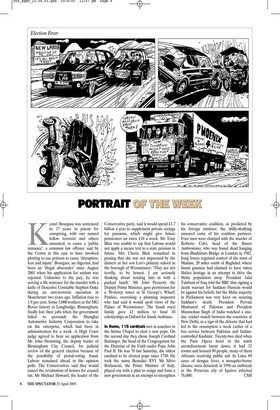PORTRAIT OF THE WEEK K amel Bourgass was sentenced to 17
years in prison for conspiring, with one named fellow terrorist and others unnamed, to cause a ‘public nuisance’, a common law offence said by the Crown in this case to have involved plotting to use poisons to cause ‘disruption, fear and injury’. Bourgass, an Algerian, had been an ‘illegal absconder’ since August 2001 when his application for asylum was rejected. Unknown to the jury, he was serving a life sentence for the murder with a knife of Detective Constable Stephen Oake during an anti-terrorist operation in Manchester two years ago. Inflation rose to 1.9 per cent. Some 5,000 workers at the MG Rover factory at Longbridge, Birmingham, finally lost their jobs when the government failed to persuade the Shanghai Automotive Industry Corporation to take on the enterprise, which had been in administration for a week. A High Court judge agreed to hear an application from Mr John Hemming, the deputy leader of Birmingham City Council, for judicial review of the general election because of the possibility of postal-voting fraud. Labour remained ahead in the opinion polls. The Conservatives said they would cancel the revaluation of houses for council tax. Mr Michael Howard, the leader of the Conservative party, said it would spend £1.7 billion a year to supplement private savings for pensions, which might give future pensioners an extra £10 a week. Mr Tony Blair was unable to say that Labour would not apply a means test to a state pension in future. Mrs Cherie Blair remarked in passing that she was not impressed by the dinners at her son Leo’s primary school in the borough of Westminster: ‘They are not terrific, to be honest. I am seriously thinking about sending him in with a packed lunch.’ Mr John Prescott, the Deputy Prime Minister, gave permission for a 50-storey tower at St George’s Wharf, Pimlico, overruling a planning inspector who had said it would spoil views of the Palace of Westminster. The Saudi royal family gave £2 million to fund 10 scholarships at Oxford for Saudi Arabians.
In Rome, 115 cardinals met in conclave in the Sistine Chapel to elect a new pope. On the second day they chose Joseph Cardinal Ratzinger, the head of the Congregation for the Doctrine of the Faith under Pope John Paul II. He was 78 last Saturday, the oldest cardinal to be elected pope since 1730. He took the name Benedict XVI. Mr Silvio Berlusconi, the Prime Minister of Italy, played coy with a plan to resign and form a new government in an attempt to strengthen his conservative coalition, as predicted by his foreign minister; the shilly-shallying annoyed some of his coalition partners. Four men were charged with the murder of Roberto Calvi, head of the Banco Ambrosiano, who was found dead hanging from Blackfriars Bridge in London in 1982. Iraqi forces regained control of the town of Madain, 20 miles south of Baghdad, where Sunni gunmen had claimed to have taken Shiites hostage in an attempt to drive the Shiite population away. President Jalal Talabani of Iraq told the BBC that signing a death warrant for Saddam Hussein would be against his beliefs; but the Shiite majority in Parliament was very keen on securing Saddam’s death. President Pervaiz Musharraf of Pakistan and President Manmohan Singh of India watched a oneday cricket match between the countries at New Delhi, as a sign of the détente that had led to the resumption a week earlier of a bus service between Pakistan and Indiancontrolled Kashmir. Twenty-two died when the Paris Opera hotel in the ninth arrondissement burnt down; it had 32 rooms and housed 90 people, many of them Africans receiving public aid. In Lima 89 cases of dengue fever, a mosquito-borne disease, were detected; in 1990 an outbreak in the Peruvian city of Iquitos infected 76,000. CSH



















































 Previous page
Previous page